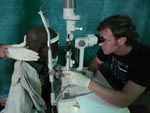Hernán E. Gras made his first trip to Bolivia this June as a medical supervisor of the Eyes of Bolivia programme, a position he has held since the beginning of the year. His focus was forming a commission that aimed to detect the capacities of local health workers that the Foundation has been training since the project began in 2003. A professional of the Humberto Notti Paediatric Hospital and the Central Hospital of Mendoza, he is the representative of the Foundation in Argentina and maintains a close relationship with Eyes of the world, which has led him to form expeditions to Mozambique and Mali, apart from Bolivia.
What is your view of the June commission in El Alto?
It was a very important trip for me since it was my first time as a medical supervisor. In this role, it was interesting to familiarize myself with the needs of the doctors currently working in El Alto who are in charge of the offices formed and funded by Eyes of the world.
How has the knowledge of Bolivian professionals advanced since the start of the project?
Very much, since the Foundation has arrived in the area different ophthalmologists have been trained, other professionals have traveled to Barcelona for training and important contributions have been made through videoconferences. Videoconferences are an interactive and very interesting tool because, as in a live class, students can raise their doubts in real time.
What are the strengths of your work and what do you need to learn?
The truth is that they are quite committed to the Foundation and value the training received. Regarding to what needs to be improved, I would talk about more technical topics, probably cataract surgery through phacoemulsification.
At what point is the Eyes of Bolivia project at the moment?
In my opinion, it is at a very advanced stage, a lot of work has been done and in an orderly manner, although it is very ambitious. We have trained ophthalmologists from the beginning who have since worked in five offices that did not exist. In the immediate future we would be interested in El Alto having five offices and two 100% operational operating rooms with native ophthalmologists.
What differences do you find between this programme and the others that you have gotten to know?
Working in Bolivia is very different than working in Africa, where the logistics are very complicated. Developing activities in El Alto, which is thirty minutes from La Paz, which however poor it may be, it is a capital, it is more simple than being hundreds of miles from the nearest airport like in Africa.
How do you explain the involvement of Argentine professionals with the projects of Eyes of the world?
In Argentina ophthalmology is very developed and being supportive of our people makes us feel good about ourselves and the environment. At first I gathered some friends for these projects but today they call me from all over the country to collaborate.
What does being a volunteer of the Foundation bring to you?
It helps me ground myself and see the world from a global perspective, value what I have in terms of resources and opportunities. It reminds me that knowledge is a loan and it is our obligation to pass it on.
